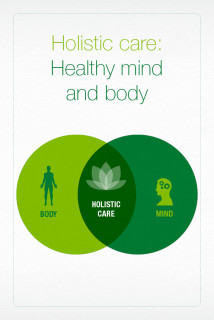That’s the beauty of holistic care – it focuses on the uniqueness of each individual and can be customized to your health and wellness goals, whether you want to restore balance in your life or relieve pain.

So what exactly is holistic care? It’s an ancient form of healing that dates back thousands of years. The holistic approach to medicine relies on the belief that our well being is not just physical and instead that our physical, emotional, social, spiritual and environmental states are interconnected. The belief is that these should be managed together so that the person is treated as a whole.
Medical professionals who practice holistic care believe health and wellness should be evaluated constantly, not just when you’re sick. Because of this, treatment goes beyond symptom management to educating individuals about lifestyle choices, relationship counseling, mental health and nutrition.
You may have heard holistic care referred to as integrative medicine. Integrative medicine is when holistic care and traditional health care are used together to treat a medical condition. Combining care allows your providers to recommend alternative forms of therapy, whether it be acupuncture, medical massage or yoga to complement your traditional care approach. For example, medical massage could complement pain medication to reduce pain in patients who have a chronic condition. And acupuncture can help with issues of digestion such as nausea, which are sometimes a side effect of many health conditions or necessary prescription medicine. Integrative care could also be an option for patients who are interested in non-invasive or non-prescription options.
When used in combination with traditional care, integrative care can promote healing, resulting in quicker recovery time and fewer side effects. When practiced frequently to achieve general health and wellness objectives, holistic care can reduce fatigue or stress, enhance your mood and increase energy or relaxation. Equally as important, holistic care focuses on living balanced, healthy lifestyles that can result in prevention of medical conditions and ultimately fewer visits to the doctor.
Medical professionals who practice holistic care believe health and wellness should be evaluated constantly, not just when you’re sick.
Remember, the outcomes of holistic treatments may vary depending on specific conditions and lifestyles. If you are considering adding holistic care into your health care mix, talk to your doctor to make an informed decision regarding potential treatment plans. Even if your doctor can’t recommend a specific practitioner, he or she can help you understand the possible benefits before you try a treatment.


